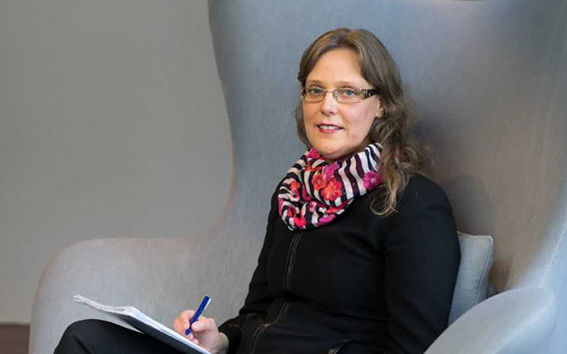Eija Tanskanen, Sodankylä geophysics observatory and University of Oulu
"It can take years to put the applications of your own work into practice, and the quartile in this field is said to be 25 years"

"Get to know the things that interest you. When you think about the inefficiencies and dysfunctions of society, try to find your own solutions."
Eija has a very diverse educational background: physics, chemistry, mathematics, education, didactics and philosophy at the Universities of Jyväskylä and Helsinki. Eija was attracted to study physics at the University of Jyväskylä by a school friend a year older than her, who had already started studying mathematics after high school. However, Eija, who is curious and social, was more suited to physics than mathematics. The same curiosity was already evident during her student days: while on choir and sports trips, Eija spent her spare time exploring local universities.
Eija's first job was as a course assistant at the University of Jyväskylä, where her career as a teacher began. After graduating with a Master's degree in Physics, she substituted in several schools while studying to become a teacher at the University of Helsinki. This was followed by doctoral studies in theoretical physics and assisting in the teaching of space physics at the University of Helsinki. Eija has spent half of her career abroad: at NASA's Space Research Center in Maryland, as a professor of space physics at the University of Bergen, and as a visiting lecturer at UNIS University in the Svalbard. Eija is currently a Visiting Professor at the School of Electrical Engineering at Aalto University.
According to Eija, the work of a researcher is a continuous learning process, for which her basic education mainly provides tools for knowledge acquisition and thinking. "The work itself teaches you the practical skills you need", says Eija. The job description changes as her career progresses, with an increasing emphasis on project management and student supervision. "Coming up with ideas for new projects is one of the nuts and bolts of the job", she adds. Eija's usual working day starts with reading emails, then she starts working on each day's research problem with a computer, pen and paper.
In the evenings, Eija picks up her children from nursery and takes them to their hobbies, after which the working day continues with more quiet work: for example, communicating with international colleagues in different time zones.
During her career, Eija has particularly enjoyed watching inventions being born and spreading into people's daily lives from very close quarters. She recalls not only the first NASA space weather prediction and Finland's first satellites, but also the early days of the internet at CERN, where Eija was introduced to the world's first web page in June 1993 on her way to work. Eija also cites the birth and spread of inventions as one of her greatest successes. At various stages of his career, she has for example studied gravitational lenses for studying very distant objects, cooled gases to near absolute zero with a dilution refrigerator and studied the formation and occurrence of auroras. "In recent years, I have spent much of my time understanding the Sun's activity and the effects of its magnetic storms. Magnetic disturbances affect such things as navigation, communication, electricity distribution and related societal functions", says Eija.
"My hope is to better understand how nature works around us, how the Sun's magnetic disturbances travel into near space, and to develop new instruments to better understand and predict magnetic weather and its effects on our infrastructure".
For whom is this a suitable career option?
Eija describes the study of space physics and magnetism as primarily a long-term endeavour: "It can take years to put the applications of your own work into practice, and the quartile in this field is said to be 25 years". The job of a scientist is generally suited to "a person who wonders about things big and small in the world, tries to understand the true nature of things and is patient and persistent in his search for answers to the questions that bother them". However, she believes that a motivated person will learn the technical and practical skills required.